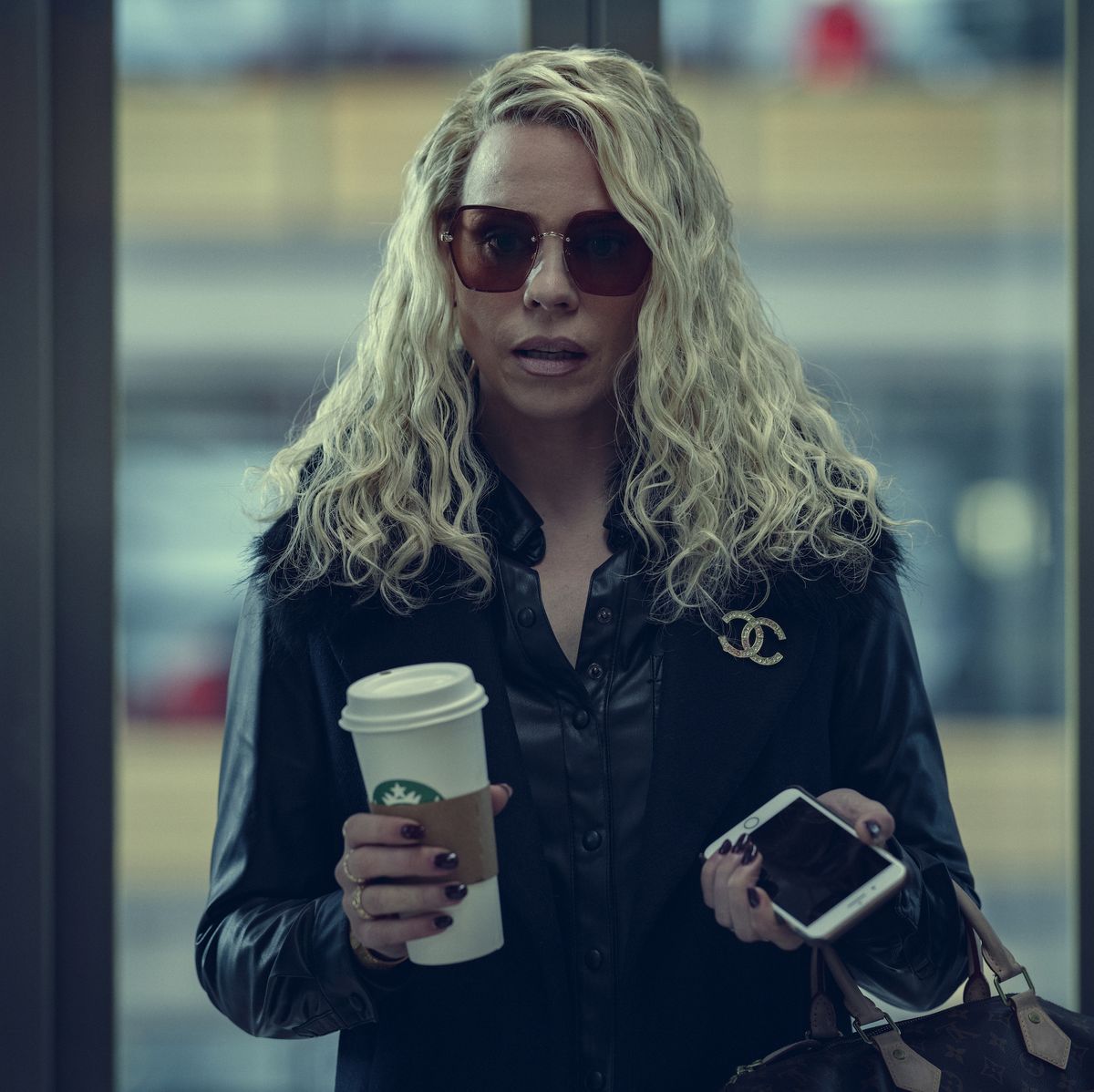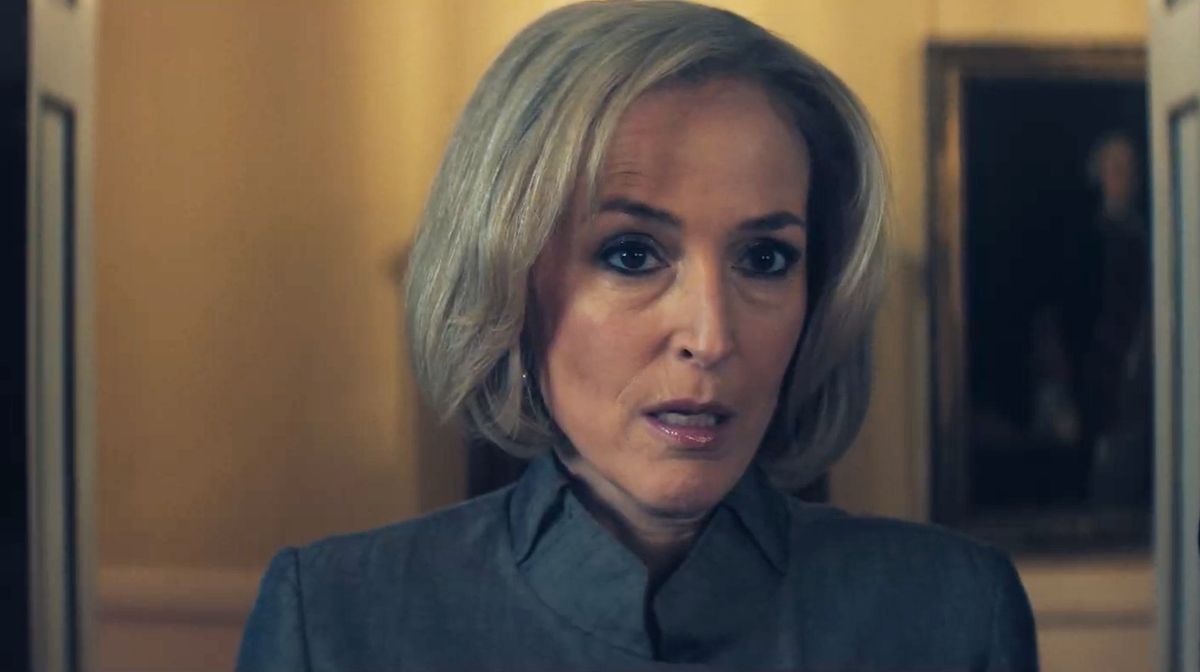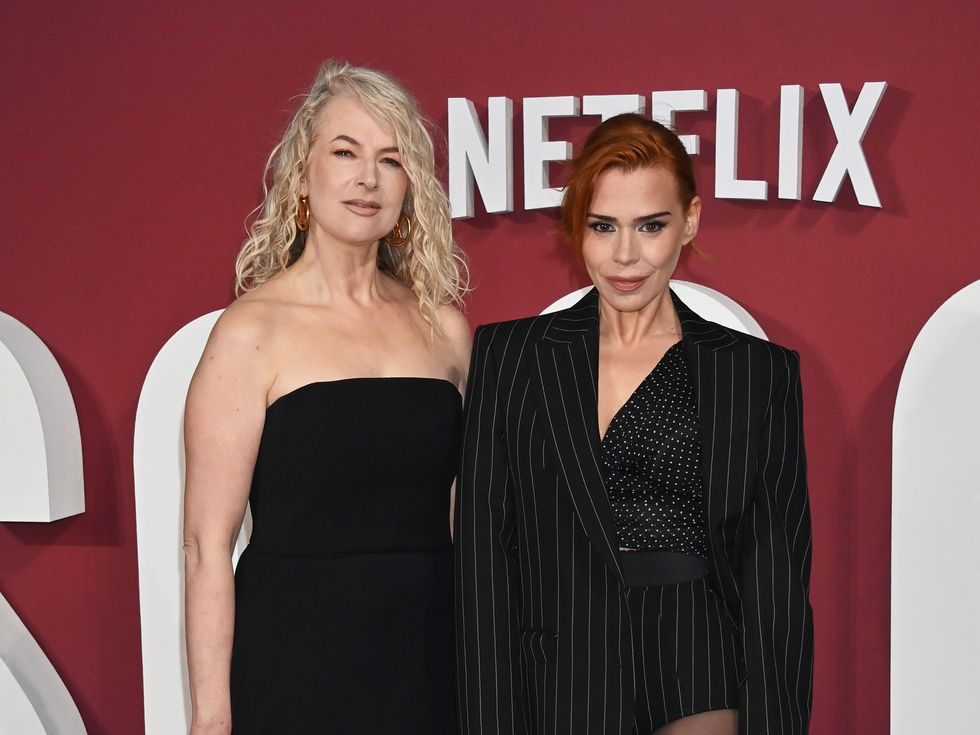Scoop, Netflix’s retelling of the Prince Andrew Newsnight interview, is effectively split between before producer Sam McAlister (played by Billie Piper) secures the interview and after. It is a thrill to watch McAlister follow a lead at the Palace, begin conversations with Andrew’s private secretary Amanda Thirsk (Keeley Hawes) and eventually land the appointment with the now-disgraced prince. The story may be familiar to those working in talent booking, but to outsiders, it is an insight into getting people to “act against their own interests”, as McAlister puts it.
When we speak in a London hotel a couple of months before the film’s release, McAlister is as she is played on screen: very smart, very blonde, defiantly herself. She opened up to Esquire about what’s truth and what was embellished in film (which she loves, by the way). “I have an excellent poker face,” McAlister tells me, and it was no doubt useful for her job, but today she appears extremely open, ready to spill on the most famous interview of the last decade.
Esquire: In Scoop, you ruffle feathers: you get in late, call other peoples’ ideas boring. At one point, a colleague calls you “very Daily Mail”. Was it really like that working there?
Sam McAlister: You have to really encapsulate the feeling of a newsroom in a couple of scenes. What Peter Moffat, the screenwriter, did so brilliantly is finding a couple of ways of showing ten years of a newsroom in a minute and a half. That scene does encapsulate it because I was really a maverick. I was unusual at the BBC, in terms of my background and my attitude, even the way I dressed. I was very vocal, very alpha, very different to lots of people who were working there. A different educational background. And I suspect that the way it’s encapsulated – that I was very Daily Mail – was, in their sense an insult. But in my sense, a compliment that I really understood something about the British public and what they were interested in. My job was, in a sense, making the kind of news that made it into the Daily Mail. So it was slightly at odds with some of my colleagues’ work. There was not a lot of antagonism at the Newsnight office, I’m afraid to report, but there are those moments: it’s a very stressful job, a lot of very strong personalities, working extremely hard in very anxious circumstances.
One of the most intriguing aspects of the film is the relationship between you and Amanda Thirsk, Prince Andrew’s private secretary, who helps facilitate the interview. You really bond over your meetings.
Loads of people will say, “Well, that was a very bad decision” about the interview and we don’t know who ultimately made the decision. My gut instinct is that it was Prince Andrew and Amanda worked for him. My experience of her was a phenomenally clever, competent, brilliant, hard-working, resilient woman who really believed in her boss and who worked so hard to try to bring him an opportunity to work with me. I was really keen that we didn’t have a reductive version of that, where she looks either foolish or incompetent. She did not suffer fools gladly. I think we had a trust and respect for one another: she was doing her job, I was doing mine, and they were slightly opposing things. But we had a professional friendship that lasted beyond the interview. She was a really classy proposition and a pleasure to work with.
One of the consequences is that she loses her job. Have you been in touch with her?
Obviously Amanda is a private individual. But we did stay in touch and she was nothing but magnanimous and generous towards me throughout. I think it’s a testament to her professionalism and classiness. And she treated me with such respect before, during and after. So certainly, when she lost her job, it did pain me but inevitably, the second in command always takes the hit when the first in command does something wrong.
When you and Emily head to the Palace to meet with Prince Andrew to discuss whether he will come on Newsnight, there is a tense moment in the conversation in which you inform Andrew of the rumours about him. Did that really happen?
You’re asking me whether I said to Prince Andrew’s face, “People know you as Randy Andy”? Yes, I did and I’ll tell you why. I didn’t do things the traditional way. The job was about connection and integrity. People had to trust you and what you were saying. And so I showed my trust to people by being honest and direct with them. We were about halfway through the negotiation at that stage, so we had been there for an hour, so it’s not quite as blunt as it sounds, but we created a real rapport. I knew he trusted what I said.
And I think that people in power respect the truth sometimes, but they’re not used to hearing it. It creates that bond of trust. If you’re the only person in the room who would call Prince Andrew “Randy Andy”, that is the human connection that can make the difference between yes and no. I don’t know how to be any different. I’m sure poor Emily wanted to kick me under the table.
And was Princess Beatrice (Charity Wakefield) really there too?
That was a real curveball. We thought we were going to negotiate with Prince Andrew and Amanda Thirsk face to face and when we arrived, he said he was bringing someone with him, and I thought it would be a lawyer. And then he said, “It’s my daughter, Princess Beatrice.” Nothing prepares you to go to Buckingham Palace and negotiate face to face with a member of the royal family about allegations that he is friends with a sex offender, and now add in that you’re doing it in front of his own daughter. We were trying to encapsulate that, whatever the rights of wrongs, whatever you do or don’t think of him, there is a daughter who loves him viscerally and who has his best interests at heart. And that shows a bit more of the complexity of the man in that moment. But it was the curveball or curveballs that she came along.
After the interview is secured, Emily prepares for the big day with producers. Your character takes a bit of a backseat then. Did you feel side-lined in real life?
I didn’t really feel side-lined. It’s the nature of the beast. You’re the surrogate. You create the child – the interview – for nine months and then you pass the baby onto someone else. So it was entirely correct and right that Esme [Wren, the Newsnight producer portrayed by Romala Garai] was prepping that interview with Emily. There is only so much room in the room. I had done my part, and then I was lucky enough to be at the interview itself.
Let’s talk about the interview. How did it feel in the room?
The atmosphere was really interesting because there was a real difference in reaction between the journalists and Prince Andrew. At the beginning, we were just waiting to see whether he would say these things on camera. And as the interview progressed, and each answer was worse than the last in a sense, it became more and more electric for us. More jeopardy, more peril because we thought: are we actually going to get this to air? We hadn’t slept or eaten and were frazzled. By the end of it, we were just understanding the enormity of what just happened. And his reaction was the polar opposite. He thought it had gone well, clearly from his reaction. He asked us to go on a tour of the palace. Emily went. I don’t know how she got through it. The pictures that you see of them walking down the hallway, unbelievably were taken after this calamitous interview. Obviously I’m not in his mind, but the impression he gave was that the interview had done extremely well.
One of the most interesting reactions in the room is between you and Amanda, because you look at each other and you’re not quite sure what she’s thinking.
Definitely. One of the difficulties of doing that interview was trying not to make eye contact with anyone. Because I didn’t want to disturb Emily’s thoughts. You didn’t want to eyeroll, for example. But Amanda and I had a professional relationship. We got on so well. And so I would have given her a professional smile at the end of the interview. What more can you do? What can you say? And I’ll never know what she thought. She definitely had a professional poker face. But I’m sure it was probably very different to what I was thinking and probably very different from what he was thinking. We will never know.
This interview has been condense and edited for clarity.
‘Scoop’ is available to watch on Netflix now
Henry Wong is a senior culture writer at Esquire, working across digital and print. He covers film, television, books, and art for the magazine, and also writes profiles.














